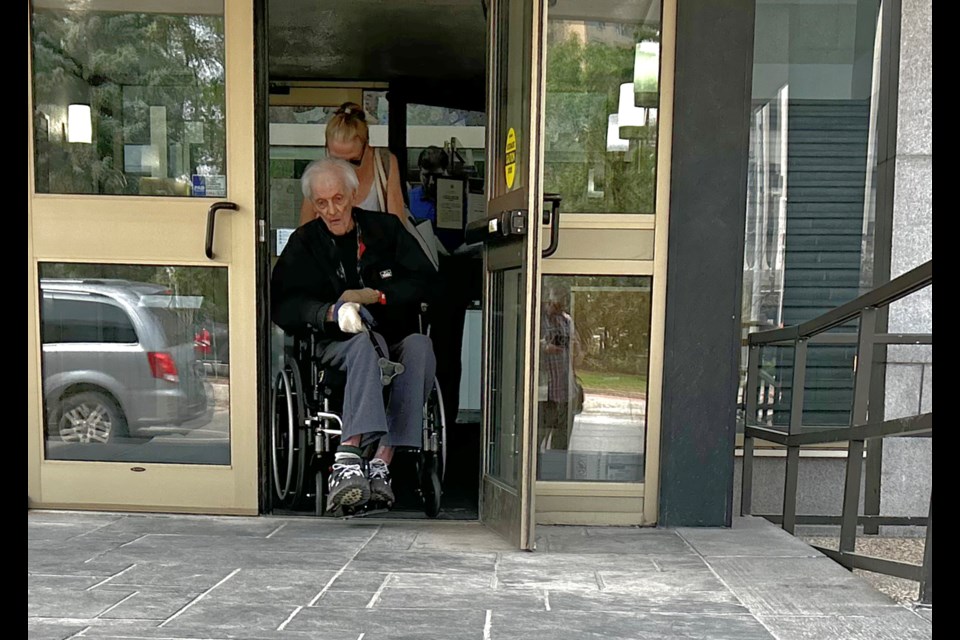REGINA — Accusations of business deals gone sour were the base of the Crown’s cross-examination during the fourth and fifth days of a murder trial in Court of King’s Bench.
Crown prosecutor Adam Breker attempted to paint a picture of two brothers squabbling over land and money; creating a motive for Joseph Thauberger to murder his brother.
“Here this land is. Land that is in his name that now he wants to sell,” Breker stated. “He wants to sell your land, that’s true. He was becoming a very difficult business partner for you.”
“We had minor disagreements,” Joseph acknowledged.
Joseph is charged with first-degree murder and indignity to a body in relation to the 1997 death of his brother Patrick. In 2020, Patrick's body was unearthed, and Joseph spent some time behind bars before coming up with a $25,000 bail.
Some key interactions were from an undercover investigator, who garnered a 2020 confession from Thauberger that he murdered Patrick Thauberger. According to Joseph, a deal involving trading secrets with the man whose real identity was unbeknownst to him, would result in Joseph gaining approximately $30,000 - hence his confession.
Joseph maintained Patrick’s death was accidental, falling down a flight of stairs, but that he had to “cover it up” through moving Patrick’s body to farmland east of Regina and disposing of it. Several times during his testimony, Joseph cited not wanting to be found falsely accused of murder. He claimed this fear was what drove him to hide Patrick’s body and pay someone else to bury it in a slough.
In one exchange, Joseph explained why telling his truth – that Patrick’s death was accidental – would not be a desired outcome when it came to making the pact with the undercover officer.
“You had never told anybody that you covered up an accident,” asked Breker.
“That one guy that helped bury him,” Joseph replied.
“Sure, we’ll talk about the mystery guy later. Why didn’t you tell him (the undercover officer) the truth?”
“Because my brother’s death was accidental – that would disqualify me from the $30,000,” Joseph explained. “He made that very clear – in order for him to trust me, I had to tell him about something I had done in the past that was very bad.”
“I’ve gotta impress this guy with my evilness,” he added.
Joseph reiterated to Breker that his murder confession was a fabrication to secure the money.
“It’s all part of the whole deception. That’s part of the deal - in order for him to trust me, I have to show him that I’m a scoundrel and a skunk and I’ve done something very bad in my past,” Joseph explained. “That’s what I had to do for my $30,000.”
During the video confession with the undercover officer, Joseph admitted to bludgeoning Patrick with a hammer in the kitchen - a detail also brought into question during cross-examination.
“Why would you lie about the location where he died?” Breker asked.
“If I was gonna kill him, that was the most likely place to do it,” Joseph replied.
“You didn’t think the hallway would be a believable story?”
“I wouldn’t do it in the hallway.”
At one point in proceedings on Wednesday morning, Breker noted there are three stories proposed by Joseph, only one of which is true: that he dropped Patrick off at the bus depot and never saw him again, that Joseph killed Patrick with a hammer in the Francis Street home, and that Patrick’s death was caused by a fall down the stairs.
“The first was the $32,000 version,” Joseph explained. “Falling down the stairs, that happened on Sept. 3, 1997, but I never told anybody about that - except after I was in jail. I told the policeman that, too.”
The version Breker focused on was the one told to the undercover cop.
“You were telling him the truth, Joe. Why not be honest about it at this stage in your life?” he said.
“I was very close to Patrick for most of my life,” Joseph replied. “It was only in those last few years when he started to lose his marbles a bit. That all changed fundamentally in July, 1996.”
During that summer, Joseph received a payout for a back injury he had sustained, the gross amount being $125,000. According to Joseph, at that point he was “rolling in dough,” therefore money or land would not be a motive to murder his brother.
Closing out the Wednesday morning cross-examination, Breker presented photographs of items evidenced during the voir dire trial. In particular, one image was that of a hammer wrapped in duct tape and some sort of material around the head. Another image was that of a crosscut saw, and a final image of Patrick’s shoe.
Joseph explained that the truck used to haul Patrick's body actually belonged to his deceased brother, and that perhaps those items belonged to him, as they were retrieved from the back of the red pick-up.
It seemed as though the exasperation of being in the witness stand was getting the best of Joseph Wednesday afternoon as Breker was winding down his questions.
"It seems like at this point in your life, you can't figure out why everyone's going through all this fuss over something so insignificant," Breker posed to Joseph. "Why doesn't everybody just let sleeping dogs lie?"
"Yeah, just let me die in peace," Joseph replied. "I've got one foot in the grave, and the other on a banana peel."
When Breker pressed if Joseph thought Patrick's death was indeed insignificant, Joseph again stated, "no, but I had a choice of going to jail or covering it up."
Both Crown and defense had no further evidence to bring before the court, and through some discussion, Judge Janet McMurtry ultimately set June 28 as the day to hear arguments from both sides.
— for more from Crime, Cops and Court.




